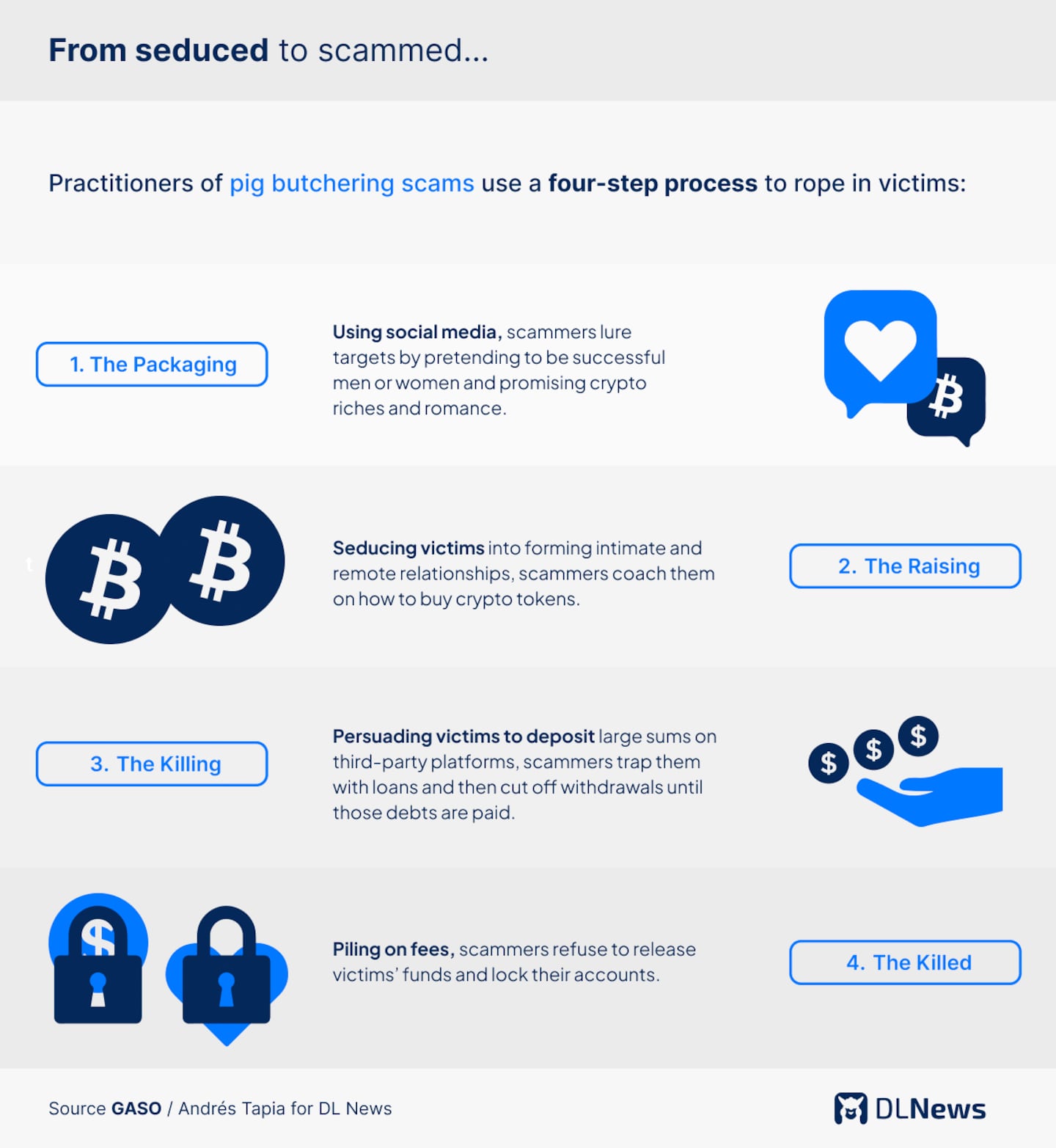- In 2021, Hannah became the victim of a 'pig butchering' scam after meeting a man on a dating app.
- Cheated out of $80,000, she decided to set up a non-profit group to combat these frauds.
- Thousands of people, many forcibly, toil in compounds run by organised crime groups, officials say.
The air inside the Starbucks was thick with the aroma of freshly brewed coffee, punctuated by the distant hum of grinding beans, and the murmurs of patrons huddled over laptops.
It was a sanctuary of modern comforts amid the rough and bustling streets of one of Southeast Asia’s major cities — hardly the setting you’d associate with stories of deceit, broken hearts, and financial ruin. Yet, here I was waiting to meet someone to discuss just that.
Scammed
Hannah ordered a coffee and sat down, friendly but reticent. She has told this story many times. She was probably sick of repeating it over and over again. (Her name is a pseudonym to protect her identity from organised crime members and hostile governments.)
“I was scammed between the months of March and April, 2021,” she began. “I was going through a divorce back then and I happened to meet this guy.”
She met the man in question on a dating app. He seemed nice. But over the next few months he took her through a series of what Hannah now calls “scripts,” a well tested strategy scammers deploy to ensnare and fleece their victims. And crypto plays a key role in the grift.
Dubbed “pig butchering,” the process goes through four phases: packaging, raising, killing, and killed.
It’s a cycle Hannah knows all too well. After enduring months of being defrauded she wound up losing $80,000 and struggled to make ends meet. She was so stigmatised by the ordeal that she didn’t share what happened with her family.

Pig butchering, which combines elements of loan sharking and classic financial fraud, has rapidly become one of the most prolific crypto scams in Asia. On Tuesday, police in Myanmar and China arrested 269 people across 11 scam compounds in the north of Myanmar. While pig butchering wasn’t specifically mentioned by officials, it’s a scam of choice for such operations along with investment and gambling scams.
The number of people detained isn’t unusual — a similar raid in the same region last month detained 225 people. But of the 269, 21 are thought to have played key roles in the scams, which have robbed people of some 120 million RMB ($16.5 million).

It’s unclear how much money has been lost to pig butchering on a global basis. In 2021, the FBI’s Internet Crime Complaint Center in the US received more than 4,325 complaints with losses of more than $429 million stemming from romantic-investment scams using cryptocurrencies, according to its annual internet crime report.
Highly developed operations
Despite its crude name, pig butchering is a highly developed operation. TRM Labs, a blockchain analytics company, found more than half of the schemes it studied in 2021 and 2022 were linked to international organised crime groups.
Scammers begin by crafting irresistible profiles. They often masquerade as affluent, attractive Asian men or women who own their own businesses. They bombard you with charming selfies, photos of exotic food, and check-ins at glamorous locations. They may even fabricate stories about living overseas.
Typically, the scammers have an excuse to avoid meeting in person or even video chatting. They blame past trauma or a demanding work schedule. And they manipulate targets to disclose their assets. If you’re going somewhere, they may caution you on taking a train, which sounds innocent enough. But it’s a way of gaining information.
“That’s how they know that you have a car, which means you can sell your car,” she told me.
Suitors claim to be seeking a genuine romantic relationship. In Hannah’s case, her contact wasn’t the only guy she spoke with on the platform; now she thinks everyone she talked to was a scammer.
NOW READ RELATED STORY: Asian crime gangs turn to human trafficking to expand ‘pig butchering’ crypto scams
Eventually, the contact steered the conversation towards an investment platform he was using.
Hannah explained that it didn’t seem so suspicious because the man never explicitly asked her for money. At first, Hannah made a profit from her investment in the man’s scheme. Using Singaporean currency, she put in SG$500 and got back SG$520, which is about $385 US dollars. The next time she put in SG$800 and got back SG$1,000.
“It’s not just like a traditional scam where they’ll tell you that they needed money for medical treatment, for whatever reason,” she said in our interview. “The don’t tell you to give them the money. They bring you to an investment platform.”
Withdrawing wasn’t an issue, so the next time she tried a larger amount. Then it all went wrong.
‘There was this one night when I was about to attempt suicide. And suddenly I didn’t want to die. I was like, I’m gonna drive you guys out of business.’
— Hannah
The scammer sent her a screenshot of a conversation between him and the platform’s customer service agent showing he had deposited SG$35,000. But he said it was a two-person deal and directed her to match his investment.
Hannah didn’t want to but agreed. She’d been speaking with the scammer in Chinese at that point and, by her own admission, her Chinese wasn’t that good. So when he suddenly said she needed to put in SG$350,000, not SG$35,000, Hannah wasn’t sure if she’d misunderstood him and had confused the numbers herself.
When she replied that she couldn’t put up the matching funds he offered to help. He deposited SG$100,000 into her account. She just needed to make up the difference. “I thought he was actually helping me, and then I felt really bad,” Hannah says.
She started borrowing money from friends and taking out loans before she finally realised she was being ripped off. But it was too late.
Betrayal
No matter the tactic, the outcome remains tragically consistent: You’re locked out of your account and your funds are inaccessible. And you’ve not only lost the money — the scam feels like a betrayal of your trust and your hopes.
“I was depressed and I couldn’t sleep a single night for like three months,” Hannah remembered.
Singapore is not a cheap place to live. Hannah couldn’t pay for the electricity. Every month, her salary was rapidly depleted. She was struggling to afford food. And she was keeping the fact she’d been scammed a secret from her family the entire time.
NOW READ: Waves founder’s role in lost $530m raises questions about who’s to blame
“There was this one night when I was about to attempt suicide,” Hannah said. “I remember I was on the 26th floor of my building and two things came to me. Either I could just jump up out of the building and die or I could do something about this. And suddenly I didn’t want to die. I was like, ‘I’m gonna drive you guys out of business’.”
So Hannah packed her bags, left Singapore and set up a non-profit group called the Global Anti-Scam Organisation. Based in the US, it relies on volunteers from around the world, and focuses on one main task: stopping these scams at the source in Southeast Asia.
Crime compounds
According to reports on the practice by human rights groups and victims themselves, pig butchering tends to be based in large compounds located in the commercial zones of Asian urban areas. Experts say countries like Cambodia and Myanmar have become a hotbed for the scams, along with Thailand, Laos and the Philippines.
Appearances can be deceiving. To the untrained eye, the facilities look like typical offices or call centres — row upon row of agents typing away, locked in conversations in front of glowing computer screens.
But in these call centres, the chatter isn’t about customer satisfaction — it’s a predatory dance between criminal gangs and unwitting victims. Graphic designers manipulate images to fashion irresistible, fake social media profiles for the grifters.
NOW READ: Coinbase-funded lawsuit against Tornado Cash sanctions was ‘nigh impossible to win’
Meanwhile, software developers are rigorously coding investment websites — slick, user-friendly, and fraudulent. In this nefarious beehive, every worker has a role, and the ultimate product is financial and emotional devastation for people like Hannah.
The term pig butchering originates in China, which is where these scams are believed to have started. While there’s plenty of information online about pig butchering, this wasn’t the case in 2021, when it was largely confined to the Chinese-language internet.

Hannah said when she initially tried to Google the platform touted by her scammer in English she couldn’t find anything.
“Towards the end of the scam, I tried to Google it in Chinese and all this shit came up,” she recalled. “That’s the part when I realised that I got scammed and then I got really angry. I was like, ‘why didn’t this come with the English search?’ For the Chinese version, it was a forum with millions of comments.”
GASO publishes information about pig butchering in English. More than 80 volunteers — many of them scam victims themselves — carefully maintain lists of bogus investment sites, and publish guides on how the schemes work and what to watch out for.
Driven offshore
In China, pig butchering is considered a type of telecoms fraud along with gambling and other investment scams.
According to government reports, China resolved 464,000 telecom and network offences in 2022, leading to the arrests of over 350 individuals. This was a 17% jump from 2022.
But attempts to crack down on these sorts of scams have driven them offshore. The Chinese government estimates 80% of scams targeting its citizens are now based abroad, and of those almost 70% are in the Philippines, Cambodia, and Myanmar.

Last September, the Standing Committee of China’s National People’s Congress passed a series of new laws addressing telecom fraud. These laws are designed to allow Chinese law enforcement officials to pursue overseas organisations and individuals.
As for the perpetrators, experts say it appears pig butchering is being done at scale by several large players that hire and train dozens of people to develop scripts, software, social media profiles, and the skills to spot marks with ample wealth.
Trapped workers
Take Cambodia, where the number of casinos skyrocketed by 163% between 2014 and 2019. Casino-linked operations have become a springboard for organised scam operations over the last decade, according to a report by the Office of the United Nations High Commissioner for Human Rights (OHCHR).
Criminal groups also use facilities inside designated Special Economic Zones (SEZs), according to local media reports and non-profit organisations in Laos and Cambodia. Designed to foster the growth of businesses, the gangs pervert their use to support fraud.
NOW READ: How crypto scammers are embracing new AI technology
“Compounds are big with high walls and security guards with guns. Workers are not allowed to go out, but there are a lot of basic necessities inside the compound,” Hannah told me.
It’s not completely clear how many people know what they’re getting into when they apply for jobs with pig butchering outfits. Some believe they’ve got a job offer at a legitimate company, others are aware what the work entails. But in their own way, many become victims of the criminal gangs.
‘A lot of people do want to go home. They are actually trapped in the company.’
— Hannah
Although they don’t represent the majority of victims, case studies in Chinese state media spotlight an unlikely demographic: graduate students, with some holding doctoral degrees. They are often lured into the illicit operations by friends and acquaintances, experts say. GASO says an increasing number of people are drawn to these compounds from countries like Malaysia and Taiwan.
NOW READ RELATED STORY: Asian crime gangs turn to human trafficking to scale ‘pig butchering’ crypto scams
Workers in pig butchering compounds face human rights abuses, including physical and psychological torture, arbitrary detention, and various forms of labor exploitation, according to the OHCHR.
GASO has also reported on cases of rape in these compounds. “A lot of people do want to go home,” says Hannah. “They are actually trapped in the company.”
Disrupting the pig butchering complex
It felt wrong to head back to my hotel with its extensive wine list and big swimming pool after hearing the story she’d just told. But we’d finished our coffees and Hannah had someone she needed to meet. Her phone buzzed a lot: scam victims, officials, sources, other GASO members, more journalists. One of her colleagues had joined our conversation halfway through and listened quietly. They were clearly very busy.
Hannah says she’s still upset. She hasn’t got her money back. But she’s blunt about what the future holds. “Funding is running very low these days,” she admits.
Hannah and GASO have made progress in disrupting the pig butchering complex. In several cases, her team has been able to remove people from compounds, she said.
Death threats
It hasn’t gone down well. The owners of the companies are “super angry,” she says. One group in Vietnam has sent her death threats.
Hannah worries about her safety, and that of her team members. They don’t use their real names when they can help it.
But she’s realistic about their chances with the pig butcherers. “They don’t know who we are. And one day someone will ask…” she told me. “I just don’t think that I’m gonna live for very long.”
Callan Quinn, DL News’ Hong Kong correspondent, covers the crypto industry in Asia. Have a tip? Contact the author at callan@dlnews.com.



